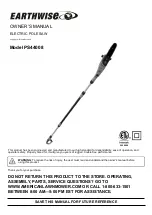
6
Safety
“READ ALL INSTRUCTIONS” — Failure to follow the SAFETY RULES identified by BULLET (l) symbol listed
BELOW and other safety precautions, may result in serious personal injury.
Double Insulated Tools
Double insulation is a design concept used in electric
power tools which eliminates the need for the three wire
grounded power cord and grounded power supply system. It
is a recognized and approved system by Underwriter’s
Laboratories, CSA and Federal OSHA authorities.
•
Servicing of a tool with double insulation requires care
and knowledge of the system and should be performed
only by a qualified service technician.
•
WHEN SERVICING, USE ONLY IDENTICAL
REPLACEMENT PARTS.
•
POLARIZED PLUGS. If your tool is equipped with a
polarized plug (one blade is wider than the other), this
plug will fit in a polarized outlet only one way. If the plug
does not fit fully in the outlet, reverse the plug. If it still
does not fit, contact a qualified electrician to install the
proper outlet. Do not change the plug in any way.
Extension Cords
•
Replace damaged cords immediately. Use of damaged
cords can shock, burn or electrocute.
•
If an extension cord is necessary, a cord with adequate
size conductors should be used to prevent excessive
voltage drop, loss of power or overheating. The table
shows the correct size to use, depending on cord length
and nameplate amperage rating of tool. If in doubt, use
the next heavier gauge. Always use U.L. and CSA listed
extension cords.
Table of Contents
“SAVE THESE INSTRUCTIONS”
Safety
.........................................................................2-6
General Safety Rules for Benchtop Tools .............2-3
Safety Rules for Miter Saws...................................3-6
Table of Contents
........................................................6
Electrical Requirements
.............................................7
Laser Warnings
............................................................7
Getting to Know your Miter Saw
............................8-9
Assembly
...............................................................26-32
Tools needed for Assembly and Alignment ............26
Unpacking and Checking Contents ........................28
Installation of Miter Lock Knob ................................28
Installation and removal of the Blade......................30
Assembling Dust Elbow and Dust Bag ...................32
Adjustments
..........................................................34-40
Blade square to Table (90°) ....................................34
Blade 45° to Table ...................................................36
Blade Square to Fence............................................38
Miter Scale (Vernier) Indicator Adjustment .............40
Laser Alignment System .........................................40
Installation
..................................................................42
Mounting Applications .............................................42
Basic Saw Operations
.........................................44-50
Body and Hand Position..........................................44
Workpiece Support............................................46, 47
Switch Activation .....................................................47
Sliding Base/Fence Extension ................................50
Saw Operations
....................................................52-58
Miter Cut ..................................................................52
Bevel Cut .................................................................54
Compound Cuts ......................................................56
Base Molding...........................................................58
Cutting Crown Molding ............................................62
Special Cuts.............................................................68
Maintenance and Lubrication
............................70, 72
Page
Page
RECOMMENDED SIZES OF EXTENSION CORDS
Tool’s
120 Volt A.C. Tools
Ampere
Cord Length in Feet
Rating
Cord Size in A.W.G.
25
50
100
150
3-6
18
16
16
14
6-8
18
16
14
12
8-10
18
16
14
12
10-12
16
16
14
12
12-16
14
12
–
–
NOTE: The smaller the gauge number, the heavier the cord.
WARNING
!







































